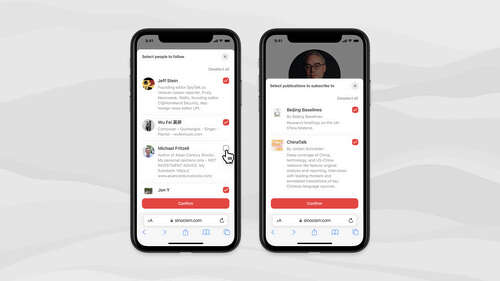
Substack is updating its peer-to-peer recommendation system, the company announced today. With this new update, Substack is helping writers aid other writers in expanding their reach and potentially getting more subscribers and followers, as the company is now allowing writers to curate and share a list of publications for their readers to subscribe to.
In a blog post, the company says the change represents a step forward and away from an era of social media that is based on “centralized discovery and control.” By allowing writers to recommend a network of other writers to their subscribers, Substack is fostering a peer-to-peer recommendation system that will in turn help writers grow their audiences. Most social media networks currently leverage algorithms for their recommendation systems, but Substack is instead focused on allowing writers to curate their own networks of recommendations.
Now, when a reader subscribes to a someone’s publication on Substack, they will see the option to opt in to a package of people to follow based on the writer’s recommendations. In the past, this screen would show a maximum of three publications that the writer recommends. Now, readers will see a list of as many publications and profiles as the writer wants to recommend.
Readers can select or unselect the people or publications that they are interested in, after which, their feed will start to include notes and posts from the people in that network.

Image Credits: Substack
Substack says the new update will help writers build up goodwill with other writers by helping them reach more people, while also helping readers curate a worldview. The platform will show writers how many subscriptions and follows they have driven for people in their network.
The company says recommendations on the platform drive 50% of all new subscriptions and 25% of new paid subscriptions. Substack notes that early data shows that its approach to recommendations increases both the number of subscriptions and followers that publications and users get.
Substack also announced today that more than three million readers subscribe to paid newsletters on its platform, up from two million a year ago.
As Substack looks to grow its recommendation system, the company saw a controversial start to the year, as it revealed that it wouldn’t ban Nazi newsletters on its platform. Substack CEO Hamish McKenzie said although Substack bans posts with “incitements to violence,” it will stick with a “decentralized approach to content moderation.” As a result of this stance, notable writers like Casey Newton and Ryan Broderick decided to leave Substack.

